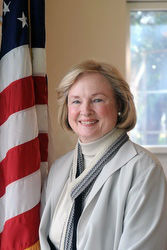Point of pride: Glendon glad to have served as Vatican ambassador
VATICAN CITY (CNS) -- When Mary Ann Glendon leaves her post as U.S. ambassador to the Vatican Jan. 19, she'll end a term that was the briefest on record yet one of the most active.
Since her arrival in Rome last February, Glendon has been kept busy with a trip by Pope Benedict XVI to the United States in April, a return visit to the Vatican by President George W. Bush in June, five major embassy-sponsored conferences and the daily rounds of diplomatic obligations at one of the world's premier listening posts.
In early December, she was co-hosting a Rome symposium on "Philanthropy and Human Rights," which featured nine expert speakers from around the world. Like many of the embassy's events, its editorial line largely reflected the Bush administration views on social and economic questions.
Glendon is unabashedly proud of having served under Bush, and she believes the last eight years have seen a convergence of U.S. and Vatican positions in such areas as humanitarian assistance, the role of faith-based institutions, religious freedom and the place of religion in civil society.
"How lucky I've been to have served here at a time when relations between the United States and the Holy See have been so close and productive," she said in an interview with Catholic News Service.
The pope's U.S. trip in April, she said, was particularly interesting to her because the pontiff made a point of praising the American model of religious freedom. Sometimes described as "positive secularism," it's a model that gives religious values a significant voice in the public square, rather than excluding them on the grounds of church-state separation.
That's a subject that's been on Glendon's mind for years as an academic. She has warned that this American model is "fighting for its life" today against persistent efforts to limit religion's influence on government.
It just happens that the American model of religious freedom is also the topic of the U.S. Embassy's last big conference under Glendon, to take place Jan. 13 in the presence of other diplomats accredited to the Holy See and Vatican officials.
Among the speakers is Philip Hamburger, who is widely considered the leading scholar on separation of church and state in the United States. Also present will be Joseph Weiler, an expert on religion and European society; Richard Garnett, who has written on law and religious freedom; and Cardinal Jean-Louis Tauran, the Vatican's top interreligious dialogue official.
Glendon is already excited about the lineup.
"It doesn't get any better than that. It's going to be the grand finale; it's going to be fantastic. Be there or be square," she said.
The January conference marks the 25th anniversary of diplomatic relations between the United States and the Vatican. It is also the last in a series of embassy conferences commemorating the 60th anniversary of the Universal Declaration of Human Rights.
Glendon said she came to the ambassador's position knowing it would be a short stint and decided to set an ambitious agenda based on those two anniversaries, convinced that human rights was an area where U.S. and Vatican interests coincided.
But her job hasn't been all scholarly speeches and diplomatic formality. In recent weeks, Glendon has begun hosting movie nights at her home for friends of the embassy, serving popcorn and screening such modern classics as "O Brother, Where Art Thou." Next up is "South Pacific." (One of the perks of her job has been the chance to order from Netflix to a State Department address abroad.)
In November, she hosted a soprano and pianist concert featuring classical music by American composers or by Italian composers inspired by American works of art. Two more concerts are in the works.
Glendon said one of the best things about being ambassador has been the endless variety of people and events.
"You never know what the day will bring, and the job varies with what's going on in the world," she said.
She also enjoyed the sense of teamwork at the embassy, she said.
"Professors are generally one-person operations. You sit in an office, you prepare your classes, you interact with your students. Here, I had an opportunity to work with a very enthusiastic, intelligent and skilled team of young foreign service officers. I haven't worked with a team like that since I practiced law," she said.
Glendon will return to her role as law professor at Harvard University in January. She'll be back occasionally at the Vatican, however, as a member of the Pontifical Academy of Social Sciences. She resigned her position as president of the pontifical academy when she became ambassador, and whether she would return as academy president again is "up to the Holy Father," she said.
At Harvard, Glendon goes back to a six-month research leave that will allow her to finish writing a book that she didn't manage to complete over the last year.
"I was halfway through writing it when I took the job of ambassador," she said. "I must say, I expected I would have a little spare time in this job, but it didn't work out that way."



















